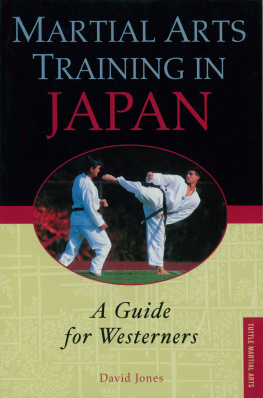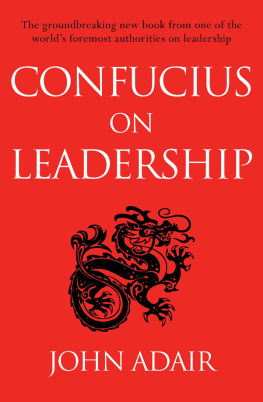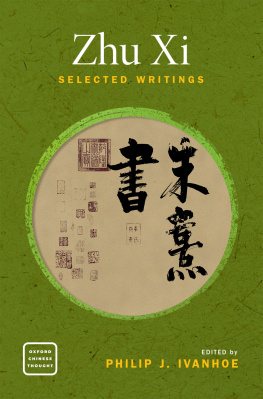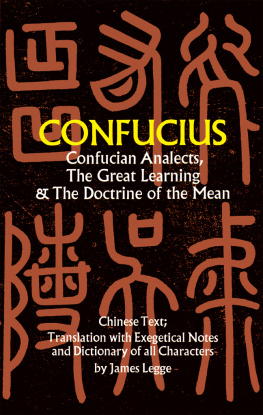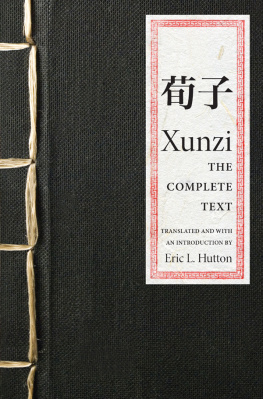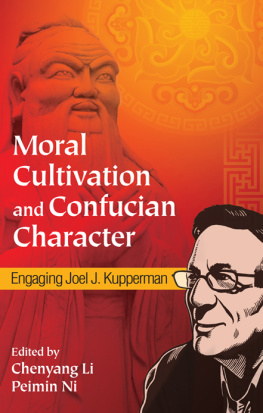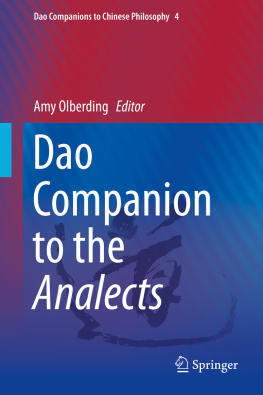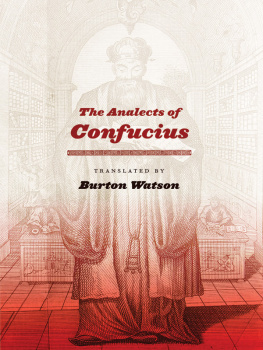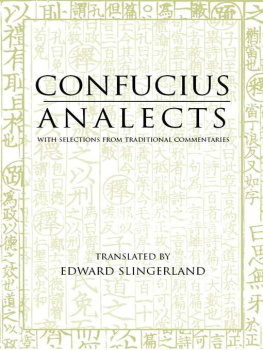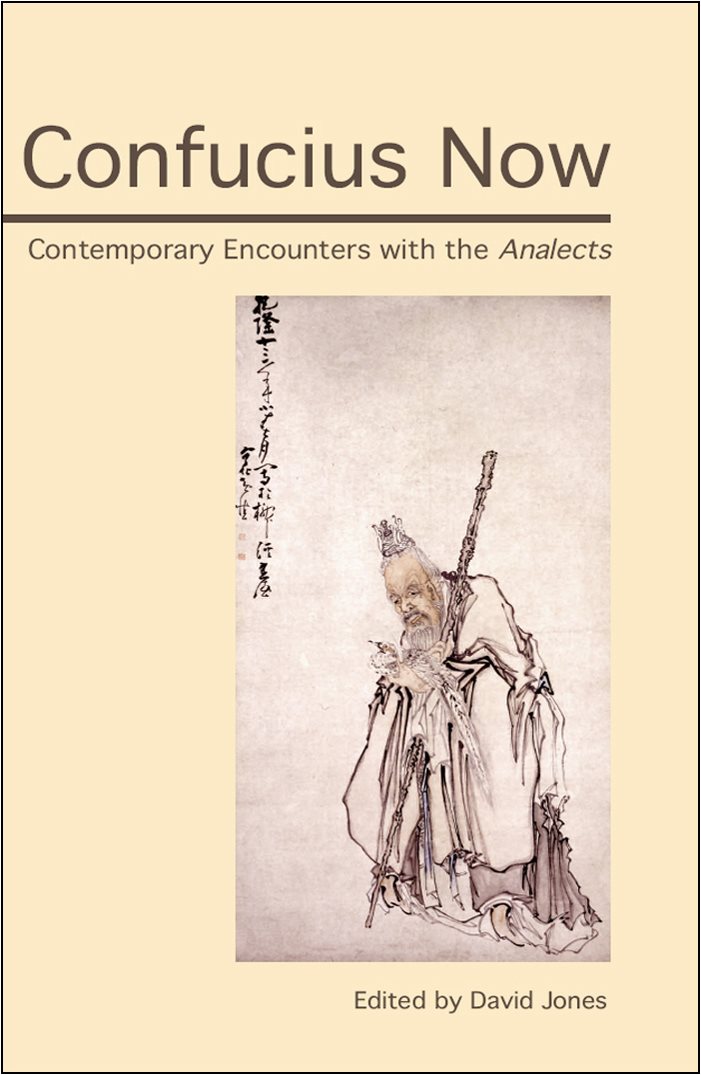Confucius Now

To order books from Open Court, call 1-800-815-2280 or visit www.opencourtbooks.com.
Open Court Publishing Company is a division of Carus Publishing Company.
2008 by Carus Publishing Company
First printing 2008
All rights reserved. No part of this publication may be reproduced, stored in a retrieval system, or transmitted, in any form or by any means, electronic, mechanical, photocopying, recording, or otherwise, without the prior written permission of the publisher, Open Court Publishing Company, 315 Fifth Street, P.O. Box 300, Peru, Illinois 61354.
Library of Congress Cataloging-in-Publication Data
Confucius now : contemporary encounters with the analects / edited by David Jones.
p. cm.
Summary: A collection of essays on the teachings of the ancient Chinese philosopher Confucius as collected in the Analects, focusing on the relevance of Confuciuss project for contemporary life and scholarshipProvided by publisher.
Includes bibliographical references and index.
ISBN-13: 978-0-81269-928-9 1. Philosophy, Confucian. 2. Confucius. Lun yu. I. Jones, David Edward.
B127.C65C67 2007
181'.112dc22
2007040710
Contents
Guide
Contents
Confucius Now: Contemporary Encounters with the Analects provides a foundational narrative of resonating voices that articulate the contemporary importance of Kongzi, or Confucius, one of the worlds greatest teachers and philosophical thinkers. Confucius is Chinas first great teacher and the lifes blood of what it means to be Chinese today, even after the Cultural Revolution that attempted to eradicate all that was religious in China. But the religion of China never really accustomed itself to the views of transcendence embraced by the Abrahamic traditions of Judaism, Christianity, and Islam or those found in pre-Buddhist India. The Chinese religious sensibility emerged as an immanent practice that sought harmony over freedom, consensus over choice, intimacy over integrity, and communitarianism over individualism. These religious sensibilities find their clearest and fullest expressions in the philosophies of China, especially in the philosophy of its first master, Kongzi.
This book is in many ways a religious book. Its religiosity is akin to the human spirituality found in Confuciuss own thinking, in his own words compiled into the ordered sayings (Lunyu, or Analects) by his students, and in the spirituality of the Chinese people that these ordered sayings reflect. For Confucius, this spirituality is irrevocably social, as Henry Rosemont, Jr., and Roger T. Ames, two of our contributors, often say, and there is nothing more natural than human sociability. And as Edward Slingerland, another contributor, has written in his translation of the Analects, the social world should function in the same effortless, wu-wei fashion as the natural world. To learn to be natural and effortless, to be wu-wei, with our fellow human beings is a philosophical and religious challenge that is clearly and insightfully articulated by the writers in this volume.
One goal of Confucius Now is to celebrate the revival of Master Kongs teachings. The contributors of this book have all contributed to putting Confucius back on the radar screens of academic philosophers and the thoughtful general public. This is especially so of Herbert Fingarette, Roger Ames, Henry Rosemont, Jr., Philip J. Ivanhoe, Edward Slingerland, and Kwong-loi Shun. In his landmark book Confucius: The Secular as Sacred, Herbert Fingarette, who came out of retirement for this project, was looking for an alternative to Western philosophizing, especially the way Westerners approached their ethical lives. He turned to Confucius and initially found him to be a prosaic and parochial moralizer and his collected sayings, the Analects, seemed... an archaic irrelevance. As a young student, my impression of the Master was similar to Professor Fingarettes, but over the years through a generation of translations of the Analects such as Arthur Waleys, D. C. Laus, Roger Ames and Henry Rosemonts, and Edward Slingerlands (and there are other fine ones) I overcame that original reaction and came to the same conclusion as Herbert Fingarette: Later, and with increasing force, I found him a thinker with profound insight and with an imaginative vision of man equal in its grandeur to any I know. The profound insight and imaginative vision of Confucius and its reach into the future is not expressed in any volume better than this current one.
Another reason for compiling this book is to put into some form of practice what Confucius taughtthe intergenerelationality of teacher and student. The distinguished Confucian scholars present in this volumeHerbert Fingarette, Roger Ames, P. J. Ivanhoe, Henry Rosemont, Jr., and Kwong-loi Shunbring some of their best students, themselves now rising in the ranks, with them: Jim Behuniak, Sor-hoon Tan, Ni Peimin, Mary I. Bockover, Amy Olberding, Hui-chieh Loy, Jeffrey Richey, and Edward Slingerland. This book celebrates the relationship between teachers and students by bringing them together, often for the very first time, by providing a forum for their voices to resonate with each other and sometimes even to disagree. Being irreducibly social, the relationship between student and teacher is one of the most important we have.
Confucius Now represents a historic occasion because it not only brings together some of the rising stars in Confucian scholarship with their teachers, but also brings together scholars never appearing in the same book before. The Confucian table is a large one with room for varying interpretations of the great master, and it is a place for conversation, for it is through conversation that families flourish and robust relationships ensue, and the family is central to Confucianism.
We begin our encounter with the Analects through the recreation of a portion of the book that inaugurated Western philosophical interest to the philosophy of Confucius. In Discovering the Analects, Herbert Fingarette reworks his ideas from Confucius: The Secular as Sacred. He begins by saying, There is no doubt that the world of the Analects is profoundly different in its quality from that of Moses, Aeschylus, Jesus, Gautama Buddha, Laozi, or the Upanishadic teachers. In most respects the Analects represents the world of a humanist and a traditionalist. He is, however, sufficiently traditional to render a kind of pragmatic homage, when necessary, to the spirits. Fingarette proceeds to his main concern, li, the rites or ritual propriety. The importance of li can never be underestimated, and we owe a debt to Herbert Fingarette for bringing attention to its supreme significance with the publication of Confucius: The Secular as Sacred. As we recall, Yan Hui, Confuciuss most exemplary student and beloved disciple, inquires about ren, authoritative conduct or benevolence, and is told how to become ren in the following way: Do not look at anything that violates the observance of ritual propriety; do not listen to anything that violates the observance of ritual propriety; do not speak about anything that violates the observance of ritual propriety; do not do anything that violates the observance of ritual propriety (12.1). As Fingarette says,
Holy rite [li] is thus a luminous point of concentration, concrete symbol, and expression of the ideally all-inclusive human harmony, the


